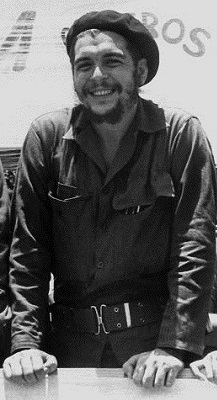|
~ Ernesto Che Guevara
~ Galéria
~ Oldal
~ Bejelentkezés
~ Vissza a Főoldalra
Ernesto Che Guevara, az argentin származású forradalmár, miniszter, gerillavezér és író, Buenos Aires-ben szerzett orvosi diplomát, majd a kubai forradalom során jelentős szerepet játszott a szigetország felszabadításában és újjáépítésében. A kubai gazdaság talpraállításáért dolgozott, küzdött az oktatás és az egészségügy fejlesztéséért, az írástudatlanság és a faji előítéletek felszámolásáért. Saját példájával népszerűsítette az önkéntes munkát. Kongóban és Bolíviában is harcolt - harminckilenc éves volt, amikor az amerikai-bolíviai csapatok csapdába ejtették és kivégezték.
| | |
|

| | |
|
|
|
The Economy of the New Human Being
|
|
|
I have found a really interesting article on Juventud Rebelde - titled The Economy of the New Human Being.
Here we can read about Che Guevara's less-known ideas and thoughts about economy and politics, about how his way to Socialism/Communism was different from the Soviet model and that he even foretold the collapse of the Soviet system / the Soviet Union.
Teaser:
Most of the work of Che Guevara is still a mystery to study. His life is closely linked to intellectual work that, as he confessed in a letter in February 1964, can sometimes seem a little «obscure,» precisely because it was written mainly when «my watch read past midnight.»
However, to read it slowly is to find a great many reflections, some of them marked by the historical moment in which he lived, while others that are still incredibly valid. Many of his thoughts were ahead of the times that we have experienced over the last several years, such as the collapse of what he called the «Soviet model of socialism.»
You can read the whole article here: [The Economy of the New Human Being]
|
|
|


| | |
|
|
|
~ Ernesto Che Guevara
~ Gallery
~ Site
~ Log in
~ Back to the Main page
Ernesto Che Guevara, the Argentine-born revolutionary, minister, guerrilla leader and writer, received his medical degree in Buenos Aires, then played an essential part in the Cuban Revolution in liberating and rebuilding the country. He did his best to set up the Cuban economy, fought for the improvement of the education and the health system, the elimination of illiteracy and racial prejudice. He promoted voluntary work by his own example. He fought in the Congo and in Bolivia - he was thirty-nine years old, when he was trapped and executed by the joint American-Bolivian forces.
| | |
|
|

